• Several elections take place in the region this year and next. In Argentina, local elections scheduled for September 7, and midterm national elections on October 26, are both seen as key gauges of support of the administration and its ability to implement additional structural reforms.
First, on the local elections …
Local elections have already been held in eight of the fourteen provinces scheduled for this calendar year. Results have been, in general, favorable for incumbents, albeit in the context of relatively low participation (57% on average), considering mandatory voting. However, an important exception was the victory of presidential spokesman Manuel Adorni – of Milei’s La Libertad Avanza party - in the City of Buenos Aires (7% of the national electoral roll) on May 18, ending the Pro’s eighteen-year reign.
Looking ahead, local elections scheduled for September 7, with mandatory voting, are relevant considering a sizable share of the national voter registry participates, including the Province of Buenos Aires (37% of the total).
With no primary elections this year (suspended by law), and Cristina Fernández de Kirchner barred from running, the so-called bonaerenses (people of Buenos Aires) will elect deputies, senators, municipal councilors, and school advisors. The province is divided into eight electoral sections; each composed of different localities. The first and third sections are the largest, each comprising 35% of the provincial voter registry. Senators will be elected in sections 1, 4, 5, and 7, while representatives will be elected in sections 2, 3, 6, and 8. The contest will be between the “Frente Patria” (Kirchnerism + Peronism) and “Alianza la Libertad Avanza” (La Libertad Avanza + PRO party). Provincial polls show Alianza la Libertad Avanza as the favorite. However, the focus will likely be on who wins the third electoral district, where Peronism has historically been strongest.
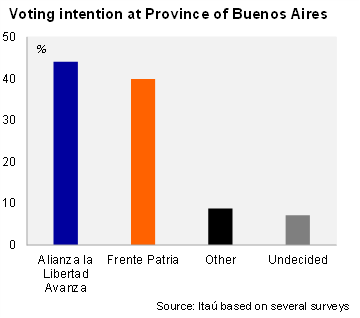
... and then the October mid-terms.
Midterm national elections are scheduled for October 26, in which half of the Lower House and one-third of the Senate will be renewed. All provinces will elect national deputies, and only eight will elect senators: the City of Buenos Aires, Chaco, Entre Rios, Neuquen, Rio Negro, Salta, Santiago del Estero, and Tierra del Fuego. The next key dates are August 7, the deadline for registering alliances, and August 17, when the deadline for submitting candidate lists expires. The campaign will begin on August 27 for the elections to be held on October 26. Please see the table below for the current composition and seats to be renewed in October.
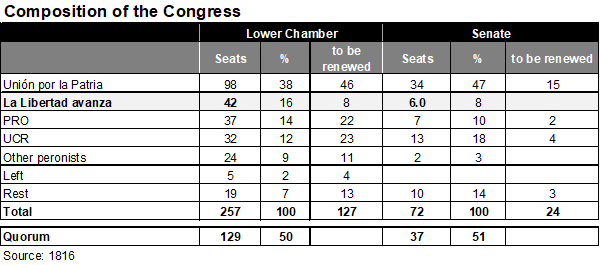
Polls show, on average, that Libertad Avanza leads voting preferences with 39%, followed by the Kirchnerism at 28%. If alliances are eventually formed, as in the case of the Province of Buenos Aires, the Libertad Alianza-Pro alliance would rise to 45%, while Kirchnerism and Peronism would total at least 35%. The election, being national in nature, serves as a good indicator of national support for the current government two years before the next presidential elections.
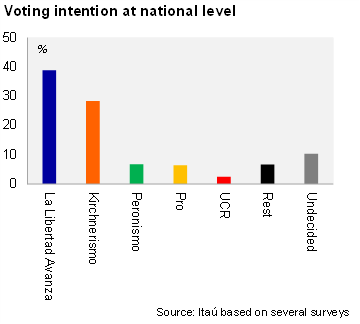
Confidence in the Government rose in July. According to the Universidad Torcuato Di Tella’s monthly survey, confidence in the government rose by 4.9% MoM to 49.0% in July. Considering the July figure, confidence in the government is only 14.3% below the peak when the government took office in December 2023.
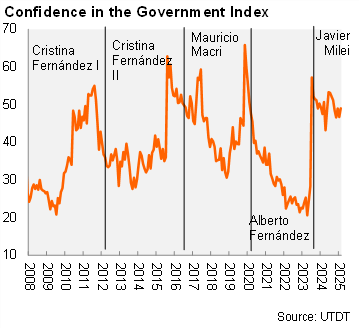
Four of its five components increased in July. The "concern for the general interest" rose by 17.5% MoM and the "honesty of public officials" increased by 5.2% MoM. Additionally, the "ability to solve the country's problems" also rose by 3.6% MoM, and the "efficiency in the management of public expenditure" increased by 3.0% MoM. On the other hand, the "general evaluation of the government" fell by 2.4% MoM. Consequently, even more respondents expect an improvement in the economic outlook, which rose by 2.2% MoM.
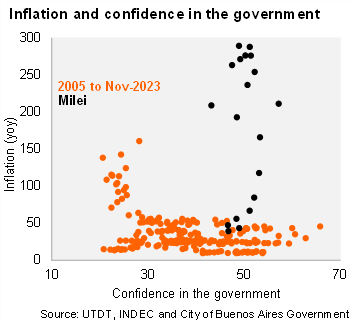
Our take: The government has made significant progress with the stabilization of the economy, despite its minority status in both the lower house and the Senate. Alliances in Congress have allowed for the approval of the so-called Bases Law in 2024, which included the Large Investment Regime (RIGI) and the tax amnesty, as well as the deregulation of multiple sectors, among other measures. The government also succeeded in suspending primary elections and implementing a single paper ballot in 2025. Greater representation of the administration’s party in Congress could pave the way for further progress on structural reforms, such as tax and labor reforms and the total lifting of exchange controls.
